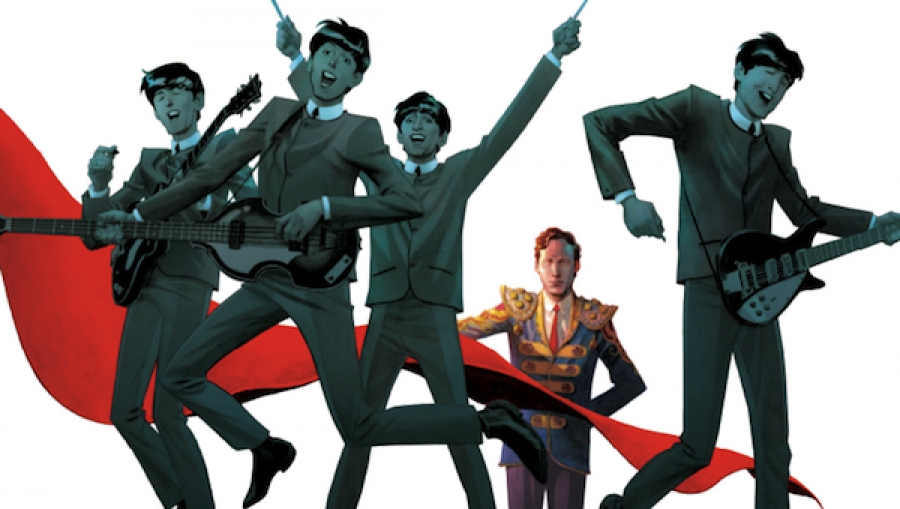The Fifth Beatle is the story of the legendary rock group’s rise to the top, but it’s not the Beatles’ story. As an entity, the Beatles are the focal point of this comic, but as characters, John, Paul, George, and Ringo are background. Personality-wise, they’re pretty much four identical copies, who all have essentially the same reactions to things and even speak in unison at times. In fact, when we first meet them there are only three, as Ringo hasn’t yet joined the band. Then, by the next scene, there he is, without a word about how he came along, or even a mention of his name. He is—they all are—irrelevant, except as part of the entity.
Instead, this is the story of the man responsible for that entity, Brian Epstein. If you don’t know the name, it’s not too surprising. But, you should. For years, the term “The Fifth Beatle” has been applied to an array of different people who were associated with the group in one way or another, from former bandmates to occasional collaborators to business partners. But, if anyone was the Fifth Beatle, it had to be Brian Epstein. He was the Beatles’ manager, but he was so much more than that. Without Brian, there would have been no Beatles. Just four lads from Liverpool playing dive bars for pocket change.
That’s not to say that the group’s success wasn’t due to their own prodigious musical abilities. But, while they were the ones with the talent, Epstein was the one with the vision. The Fifth Beatle shows how, in these four working class boys and their music, he saw what no one else could see, and it shows his struggle in trying to get the powers-that-be in the music industry to see it, too—most of whom were convinced that rock and roll was a just fad that was on its way out.
We take it for granted that the Beatles were a huge sensation in the ’60s, but, in fact, Epstein had to fight tooth and nail every step of the way to make them so. He took them to every major record label in England and was rejected by all of them, including EMI, which would later become their home. He poured huge amounts of his own money and resources into their career, going above and beyond what any other manager would do for their clients, because he believed, with all of his heart, that these were not just pop stars, but legends, and that they weren’t just going to become a success. They’d become a phenomenon.
The Fifth Beatle shows us Epstein’s passion and his struggle in trying to get the world to see in the Beatles what he did. And, more than that, it shows us his desperate yearning to be a part of something, to be accepted. For a gay man in a time and place where homosexuality was an actual jailable offense, this was not an easy thing to attain, but it’s something he was able to have with the Beatles, if nowhere else. From the moment he first heard their music, he understood them, and he spent the rest of his life doing everything in his power to be a part of it.
The comic relates this story to us in a somewhat stylized, almost fantastical, way, using a variety of effective storytelling techniques, both visual and textual. Prominent figures of the day with whom Epstein goes head to head are shown as bizarre caricatures, and many events are portrayed in interesting and unusual ways that don’t bother so much with realism as with conveying a particular emotion. And, the whole thing is peppered with sly references to Beatles songs, lyrics, and stories that lend an occasional tongue-in-cheek vibe to those knowledgeable enough to pick up on it.
The Fifth Beatle: The Brian Epstein Story is a story not only worth telling, but well told. The writing is compelling, and the artwork is beautiful and detailed. Anyone who’s a fan of the Beatles or at least understands their legacy will enjoy this portrayal of the man behind their curtain.

